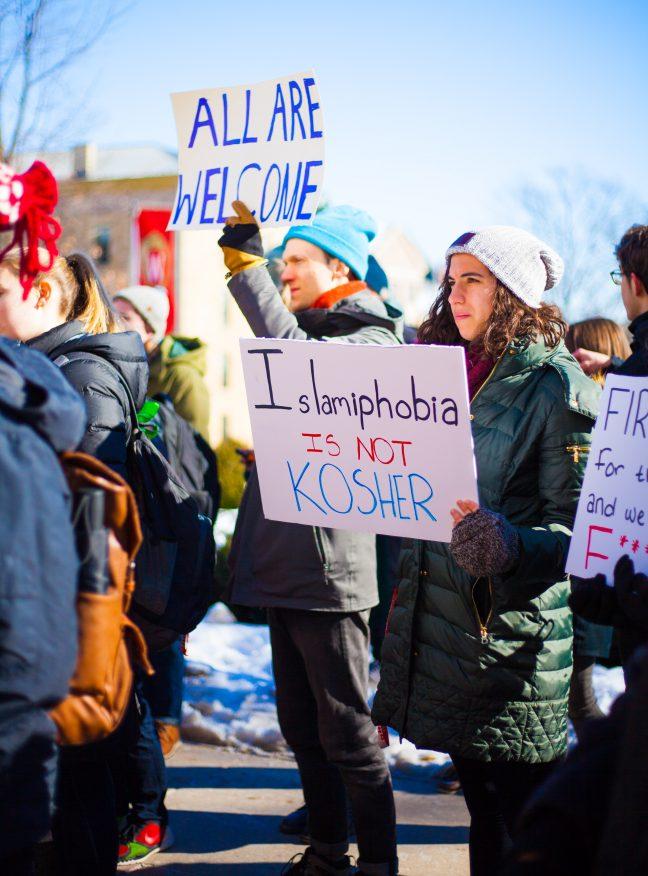In a perfect world, bloodshed belongs on the battlefield, if blood has to be shed at all. But in the past six months, innocent blood continues to flow into what should be the purest and safest of places — our houses of worship.
This past October, 11 Jews were shot and killed in their synagogue in Pittsburgh, Pennsylvania. Last month, 50 Muslims were murdered at prayer in two mosques in Christchurch, New Zealand. At the Chabad in Poway, California, four Jews were shot during a Pesach celebration Saturday.
These tragedies are linked not only by their religious aspects, but also by the motives of the gunmen. Both assailants in the Pittsburgh and Christchurch shootings support the Great Replacement Theory, a fundamentalist ideology which paints Muslims and other minority groups as threats sent to replace the white, Christian majority. The same focus on replacement was adopted by the white-supremacists who marched in Charlottesville in 2017: “You will not replace us,” and “Jews will not replaces us.”
The Pittsburgh assailant summarized the ideology in a repost to the social media site Gab, a favorite of white nationalists, “It’s the filthy EVIL jews Bringing the Filthy EVIL Muslims into the Country!!” The gunman of the Poway shooting celebrated the other two assailants online before opening fire at the Chabad. He also took credit for starting a fire at a mosque.
What many fail to realize is anti-Semitism and Islamophobia often come from the same source — white supremacism. Both Jews and Muslims are bound together in the eyes of white supremacists as agents of the “white genocide.” The term is similar to that of the Great Replacement Theory, in that the white race is supposedly dying because of immigration and “forced assimilation” orchestrated by those dastardly Jews. These theories and ideologies are set on destroying both Jews and Muslims. The only way to fight this is to stand and fight together.
There is no doubt this order is a tall one, as the first step to interfaith solidarity is admitting mistakes. Neither community is free from prejudice of the other. A leader of a New Zealand mosque blamed the Christchurch massacre on Mossad, the equivalent of the modern Jewish globalist conspiracy that has fueled anti-Semitism for generations. At the same time, Jewish Facebook communities across the world share extremely Islamophobic rhetoric. This is not meant to stir some sort of moral equivocation — only to recognize reasons for mutual animosity. Furthermore, this is not meant to generalize either community — only to shed light on an issue many choose to ignore.
At the University of Wisconsin in particular, the need for interfaith solidarity is quite strong. According to the Campus Climate Survey, Muslim students reported a less positive climate than compared to the general population of students. In the same vein, UW and the greater Madison community are not strangers to anti-Semitic vandalism.
The Islamophobic Jew and the anti-Semitic Muslim forget that the white supremacist hates them both. In times when our president defends neo-Nazis and bans Muslims from entering the country, when hate crimes in the U.S. spike 37 percent in just one year, when an unabashed white supremacist runs for office in Wisconsin, we must remember that white supremacism does not just invade white communities — it invades all of our communities and turns us against each other.
Amid divisions, disparities, students work to facilitate interfaith dialogues on campus
Hope is not lost on interfaith solidarity. Muslim organizations raised around $200,000 for the families affected by the Tree of Life massacre. In return, Pittsburgh’s Jewish community showed the same concern and support for Christchurch. The UW community is beginning to put forth a stronger effort towards interfaith solidarity, especially because of the Center for Religion and Global Citizenry’s first interfaith conference. On campus, across the nation and across the world interfaith solidarity is more important than ever.
The groundwork has been laid for interfaith support and solidarity. In the wake of these past six months of terror and innocent bloodshed, we must all remind ourselves that we are stronger together than we are alone.
Abigail Steinberg (asteinberg@badgerherald.com) is a sophomore majoring in political science and journalism.


